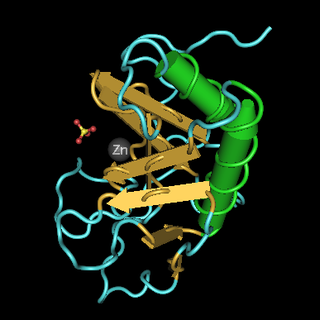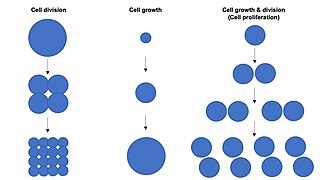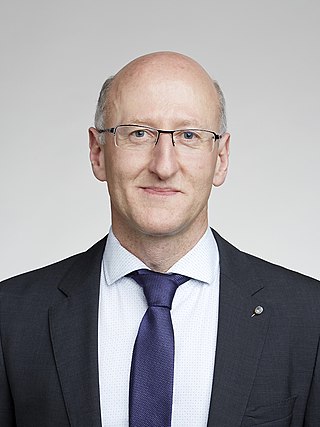Related Research Articles

Sonic hedgehog protein(SHH) is encoded for by the SHH gene. The protein is named after the character Sonic the Hedgehog.

In cellular biology, paracrine signaling is a form of cell signaling, a type of cellular communication in which a cell produces a signal to induce changes in nearby cells, altering the behaviour of those cells. Signaling molecules known as paracrine factors diffuse over a relatively short distance, as opposed to cell signaling by endocrine factors, hormones which travel considerably longer distances via the circulatory system; juxtacrine interactions; and autocrine signaling. Cells that produce paracrine factors secrete them into the immediate extracellular environment. Factors then travel to nearby cells in which the gradient of factor received determines the outcome. However, the exact distance that paracrine factors can travel is not certain.

Cell proliferation is the process by which a cell grows and divides to produce two daughter cells. Cell proliferation leads to an exponential increase in cell number and is therefore a rapid mechanism of tissue growth. Cell proliferation requires both cell growth and cell division to occur at the same time, such that the average size of cells remains constant in the population. Cell division can occur without cell growth, producing many progressively smaller cells, while cell growth can occur without cell division to produce a single larger cell. Thus, cell proliferation is not synonymous with either cell growth or cell division, despite these terms sometimes being used interchangeably.

Kim Ashley Nasmyth is an English geneticist, the Whitley Professor of Biochemistry at the University of Oxford, a Fellow of Trinity College, Oxford, former scientific director of the Research Institute of Molecular Pathology (IMP), and former head of the Department of Biochemistry, University of Oxford. He is best known for his work on the segregation of chromosomes during cell division.

Glycoprotein 130 is a transmembrane protein which is the founding member of the class of tall cytokine receptors. It forms one subunit of the type I cytokine receptor within the IL-6 receptor family. It is often referred to as the common gp130 subunit, and is important for signal transduction following cytokine engagement. As with other type I cytokine receptors, gp130 possesses a WSXWS amino acid motif that ensures correct protein folding and ligand binding. It interacts with Janus kinases to elicit an intracellular signal following receptor interaction with its ligand. Structurally, gp130 is composed of five fibronectin type-III domains and one immunoglobulin-like C2-type (immunoglobulin-like) domain in its extracellular portion.

JAK1 is a human tyrosine kinase protein essential for signaling for certain type I and type II cytokines. It interacts with the common gamma chain (γc) of type I cytokine receptors, to elicit signals from the IL-2 receptor family, the IL-4 receptor family, the gp130 receptor family. It is also important for transducing a signal by type I (IFN-α/β) and type II (IFN-γ) interferons, and members of the IL-10 family via type II cytokine receptors. Jak1 plays a critical role in initiating responses to multiple major cytokine receptor families. Loss of Jak1 is lethal in neonatal mice, possibly due to difficulties suckling. Expression of JAK1 in cancer cells enables individual cells to contract, potentially allowing them to escape their tumor and metastasize to other parts of the body.

Interleukin 20 receptor, alpha subunit, is a subunit of the interleukin-20 receptor, the interleukin-26 receptor, and the interleukin-24 receptor. The interleukin 20 receptor, alpha subunit is also referred to as IL20R1 or IL20RA. The IL20RA receptor is involved in both pro-inflammatory and anti-inflammatory responses, signaling through the JAK-STAT pathway.
Veronica van Heyningen is an English geneticist who specialises in the etiology of anophthalmia as an honorary professor at University College London (UCL). She previously served as head of medical genetics at the MRC Human Genetics Unit in Edinburgh and the president of The Genetics Society. In 2014 she became president of the Galton Institute. As of 2019 she chairs the diversity committee of the Royal Society, previously chaired by Uta Frith.
Christopher John Marshall FRS FMedSci was a British scientist who worked as director of the Division for Cancer Biology at the Institute of Cancer Research. Marshall was distinguished for research in the field of tumour cell signalling. His track record includes the discovery of the N-Ras oncogene , the identification of farnesylation of Ras proteins, and the discovery that Ras signals through the MAPK/ERK pathway. These findings have led to therapeutic development of inhibitors of Ras farnesylation, MEK and B-Raf.

Sir James Cuthbert Smith is Director of Science at the Wellcome Trust, Senior Group Leader at the Francis Crick Institute and President of the Council at Zoological Society of London.
Sir Hugh Reginald Brentnall Pelham, is a cell biologist who has contributed to our understanding of the body's response to rises in temperature through the synthesis of heat shock proteins. He served as director of the Medical Research Council (MRC) Laboratory of Molecular Biology (LMB) between 2006 and 2018.

Adrian Clive Hayday is the Kay Glendinning professor and chair in the Department of Immunobiology at King's College London and group leader at the Francis Crick Institute in the UK.

Jonathon Noë Joseph Pines is Head of the Cancer Biology Division at the Institute of Cancer Research in London. He was formerly a senior group leader at the Gurdon Institute at the University of Cambridge.

Richard Malcolm Marais is Director of the Cancer Research UK (CRUK) Manchester Institute and Professor of Molecular Oncology at the University of Manchester.

Sir Richard Henry Treisman is a British scientist specialising in the molecular biology of cancer. Treisman is a director of research at the Francis Crick Institute in London.

Neil Alexander Steven Brockdorff is a Wellcome Trust Principal Research Fellow and professor in the department of biochemistry at the University of Oxford. Brockdorff's research investigates gene and genome regulation in mammalian development. His interests are in the molecular basis of X-inactivation, the process that evolved in mammals to equalise X chromosome gene expression levels in XX females relative to XY males.

Sharon Tooze, FMedSci is an American cell biologist who has made significant contributions to the Autophagy field. She is a senior scientist at the Francis Crick Institute and was awarded European Molecular Biology Organization (EMBO) membership in 2010.
Ian Macpherson Kerr is a scientist whose research interests include the mechanism of action of the interferons, signal transduction and protein synthesis to viral infection and double-stranded RNA.
Caetano Maria Pacheco Pais dos Reis e Sousa is a senior group leader at the Francis Crick Institute and a professor of Immunology at Imperial College London.
François Guillemot,, is a French neurobiologist, currently working at the Francis Crick Institute in London. His research focuses on the behaviour of neural stem cells in embryos and adult brains.
References
- 1 2 James Briscoe publications indexed by Google Scholar
- 1 2 3 4 5 6 7 Anon (2019). "Dr James Briscoe". royalsociety.org. London: Royal Society. Archived from the original on 2019-04-24. One or more of the preceding sentences incorporates text from the royalsociety.org website where:
“All text published under the heading 'Biography' on Fellow profile pages is available under Creative Commons Attribution 4.0 International License.” --Royal Society Terms, conditions and policies at the Wayback Machine (archived 2016-11-11)
- ↑ "James Briscoe: Developmental Dynamics Laboratory". crick.ac.uk. London: Francis Crick Institute.
- 1 2 3 Brown, Katherine (2018). "An interview with James Briscoe". Development. 145 (6): dev165274. doi: 10.1242/dev.165274 . ISSN 0950-1991. PMID 29588292.
- ↑ James Briscoe publications indexed by the Scopus bibliographic database. (subscription required)
- ↑ James Briscoe publications from Europe PubMed Central
- ↑ Briscoe, James (1996). JAKs, STATs and signal transduction in response to the interferons and interleukin-6. jisc.ac.uk (PhD thesis). King's College London (University of London). OCLC 940139742. EThOS uk.bl.ethos.336443.
- ↑ Briscoe, James; Arber, Silvia (2019). "Thomas M. Jessell (1951–2019)". Development. 146 (10). doi: 10.1242/dev.180505 . ISSN 0950-1991. PMID 31126924.
- ↑ Briscoe, James; Thérond, Pascal P. (2013). "The mechanisms of Hedgehog signalling and its roles in development and disease". Nature Reviews Molecular Cell Biology. 14 (7): 416–429. doi:10.1038/nrm3598. ISSN 1471-0072. PMID 23719536. S2CID 25137907.
- ↑ Briscoe, James; Pierani, Alessandra; Jessell, Thomas M; Ericson, Johan (2000). "A Homeodomain Protein Code Specifies Progenitor Cell Identity and Neuronal Fate in the Ventral Neural Tube". Cell. 101 (4): 435–445. doi: 10.1016/S0092-8674(00)80853-3 . ISSN 0092-8674. PMID 10830170.
- ↑ Ericson, J; Rashbass, P; Schedl, A; Brenner-Morton, S; Kawakami, A; van Heyningen, V; Jessell, T.M; Briscoe, J (1997). "Pax6 Controls Progenitor Cell Identity and Neuronal Fate in Response to Graded Shh Signaling". Cell. 90 (1): 169–180. doi: 10.1016/S0092-8674(00)80323-2 . ISSN 0092-8674. PMID 9230312.